#kashmiris for black lives matter
Text
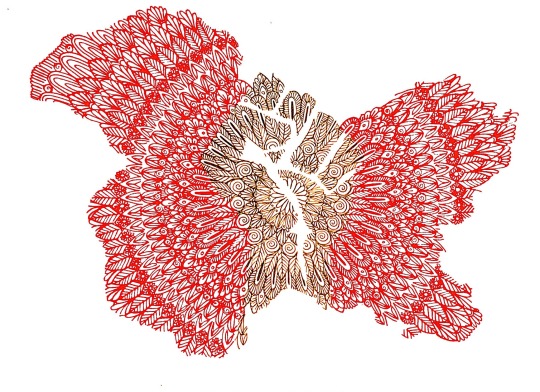
As Kashmiris, more than seeing your pain, we understand it. We feel it with you. We stand with you We support you, and we will do our best to improve and educate ourselves more every day and fix what is broken!
#Black Lives Matter#kashmiris for black lives matter#kashmir#protest#pain#art#mandala#zen#zentangle#inspiringpieces#illustration#artist#artoftheday#design#mystaedtler#relevant#2020#america#blm#stand together
11 notes
·
View notes
Text
Indian Men Cricket Team taking the knee for Black lives matter would have been a marvellous thing only if they would have responded in a similar manner for atrocities against Dalits, Tribals, Muslims and North easterns!
& in other news Kashmiri students were attacked in Punjab & Chandigarh after India’s loss against Pak. Lets see how many of these “Men in Blue” will take a “stand” against this!!
#cricket#india cricket#ind v/s pak#ind vs pak#blacklivesmatter#dalits#muslims#tribals#north eastern#Kashmiris#caste#religion
39 notes
·
View notes
Text
Just found out why no two people who cook Indian have ever achieved the same taste. It all comes down to one "ingredient".
One "ingredient" I say because it's garam masala (translates to hot spice (ish)) isn't one ingredient. Sure, you can buy it as a single ingredient, but it's essentially a mix of a bunch of Indian spices: crushed peppercorns, cumin seeds, red chilli powder, two types of cardamoms (green and black), coriander seeds (not coriander leaves mind! That's garnishing and belongs in the trash I hate it so much), and like cinnamon powder, curry leaves and a bunch more, even I don't remember them all. But the point is, the amount of each spice determines what your garam masala will taste like, because there's no one dominant ingredient really. So it comes down to your tried and tested/passed down family proportions, rather than the ingredients themselves, and this is just talking about one single 'ingredient' of a dish. Some people use ginger and garlic/ginger-garlic paste, others feel tomato and onions will suffice, some parts/cuisines of India use more sugar in cooking everything (Gujarat), some eat drier, spicier food (Rajasthan, possibly because it's like mostly desert. Little grows there!), if you head down south, the ingredients used are entirely different: they prefer rye, tamarind, round chillis (no idea what they're called)
**Update: I found out what they're called. Ramnad chillis, or locally, ramnad mundu, or gundu. They're native, naturally, to a village called Ramnad in Tamil Nadu, and they're used in the state's famous Chettinad cuisine.
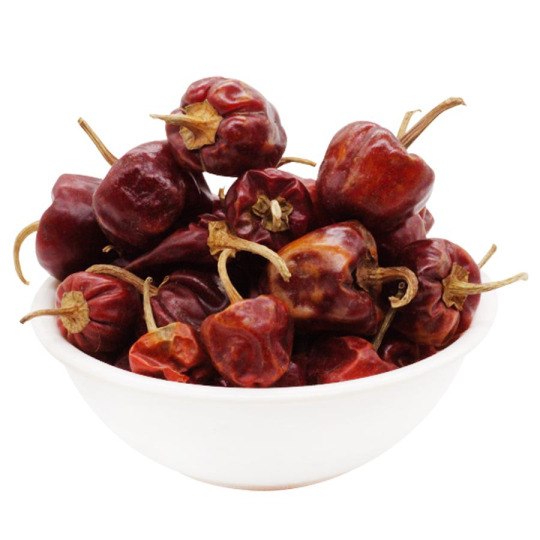
These are dried gundus, as they are when used in cooking.

Fresh gundus.
Look like cherries, don't they? Don't mistake them for cherries when you eat them!
Oh fuck saying that to myself over and over I just realised, gundu in Tamil means fat. Gundu chillis. Really. That's what you came up with, Chennai? Fat chillis? Keep it right up...
It's funny, because I had to google what red round chillis are actually named and learned that chillis aren't even native to India, no matter how they're the first thing you'd associate with Indian cuisine (general). They were introduced from Portugal in the 1500s (Vasco da Gama, etc.). Before that there was just... black pepper. Even then, north Indian food, which is even more heavily associated with spice (dried red chillis are called Kashmiri chillis, afterall!), was in the dark about chillis until much later, when a Maratha king (mid-west-ish) decided he'd had enough of northern ignorance.
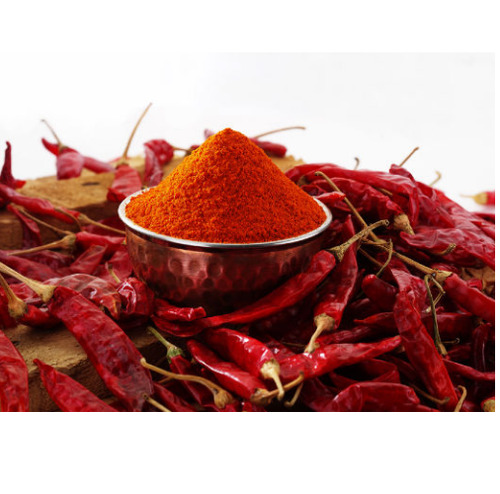
Aesthetic™. Don't you dare rub your eye. (Kashmiri chillis and corresponding red chilli powder)
(Note: that above is poetically and comedically great, but historically inaccurate. His move north was to challenge the Mughals, then emperors of India till just before the British takeover (and partly directly responsible for it), who contributed their lot to cuisine. A lot of what you think of as stereotypically heavy Indian food/takeout, is in fact Mughal and is called that in India. So while you'd "takeout Indian" in the US or Canada, "go for a curry" in the UK, you'd be "eating Mughlai" were you to order the same in India. It's assimilated into Indian cuisine comfortably enough that people sometimes use the words synonymously (or who are we kidding, use "Indian" to exclusively mean "Mughlai" and may not have heard of the latter word. Unrelatedly, I was quite pleased when a friend told me the town he lived in, which had a fair Indian diaspora, did some excellent south Indian food!)
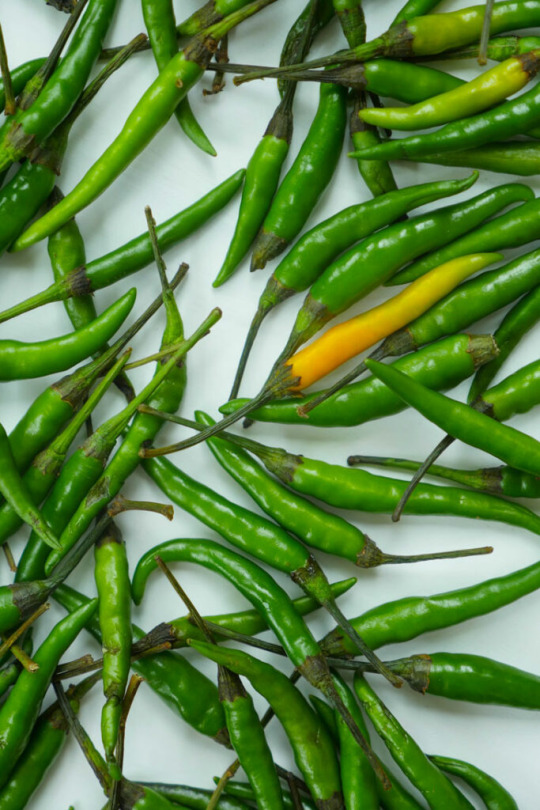
Garden variety green chillis, locally* called hari mirchi (hari = green, mirchi = chilli/spice*)
* = there are at least 200 local languages in India don't @ me
Unfortunately I cannot tell you much more about them, even after spending an embarrassing 25 minutes googling. Not sure if they are grown in Andhra Pradesh (Andhra Pradesh? Telangana? I don't even know any more 😭, and whichever of the two it is; the new Andhra Pradesh or the new Telangana, or if it was pre-split Andhra Pradesh then that, but whichever it is), it is one of the largest exporters of chilli in the world as it is! But green chillis could well be grown in Kerala. Or Gujarat. Or, as the one thing all of google unanimously agrees upon says, in your back garden from chilli seeds! God, I should grow chillis from chilli seeds. I love green chillis. Then again, all the magic of a green chilli lies in the seed: that's where all the spice, flavour and capsaicin is! I might end up eating it before we've even begun...
Anyway! I could go on for hours about chillis, there's a variety of lighter green coloured green chillis which have (allegedly) all the flavour of a green chilli and none of the spice. Yes, they do still have the seeds, they just don't bite. They're for lite spice enjoyers. That sucks the joy out of my life. That they specifically bred chillis for mildness makes my head whirl. Still, with the sheer variety in Indian chillis, it's quite passable as just Another Type Of Indian Chilli.
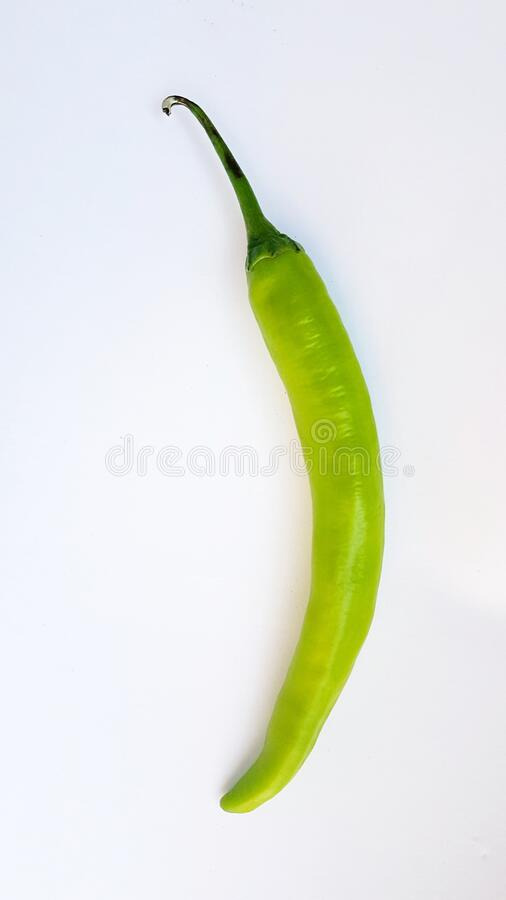
Disgust.
Anyway, I could absolutely go on about chillis for hours and this post wasn't even about chillis, it was specifically about the Indian enigma and unique kitchen handshake that is garam masaala, and we'll never figure it out. That is the conclusion. Thank you all for reading.
#I... why do I do this. Did I just spend 1000 (?) words ranting lyrical about something I am neither eating nor cooking with?#I'm so glad tumblr doesn't have a word counter or a clock. I'd regularly put myself to shame#food#cooking#spices#indian cooking#Indian spices#chillis#<3#chillis my beloved!#vengeful cooking#I guess#history#this was MEANT to be a history post
8 notes
·
View notes
Note
The Black Lives Matter movement, the Asian hate, the pandemic, islamophobia, xenophobia, the abusing and locking Latinos who cross the border for a better life in a cage, the genocide of the Palestinians, the Uyghurs, the Kashmiri people, and now this Ukrainian invasion? This is straight out of a thriller action movie and not in the slightest do I mean that in a good way. The world is a shit show honestly
these 2020s are so messy what the fuck went wrong with this new decade
6 notes
·
View notes
Text
7 notes
·
View notes
Photo


The Muslim community stands in solidarity with the Black Lives Matter Movement.
To our black brothers and sisters in America and worldwide, who are angry and grieving and fighting for their rights, we are with you. Your struggle is a struggle we should all be a part of.
As Muslims, we should know that our fight for justice is meaningless if it does not call for an end to oppression for people of all faiths and races. Allaah tells us in the Qur’aan, “O humankind! We created you from a single (pair) of a male and a female, and made you into nations and tribes, that ye may know each other (not that you may despise each other). Verily the most honoured of you in the sight of Allaah is (he who is) the most righteous of you.” (Al Qur’aan 49:13)
Racism is a virus that has infected our communities since as long as we can remember, and Prophet Muhammad (pbuh) warned us against it in the clearest of terms when he said, in his farewell sermon, “All humankind is from Adam and Eve, an Arab has no superiority over a non-Arab nor a non-Arab has any superiority over an Arab; a white has no superiority over a black nor does a black have any superiority over a white except by piety and good action.”
The Qur’aanic verses and the sayings of the Prophet (pbuh) have taught us the importance of equality between people of all nations and colours. That race is no factor in determining a person’s worth, and that we must defend those that are persecuted because of it.
Al Bara’ bin Azid said, “The Prophet ordered us to do seven things … to defend the oppressed.” (Saheeh Bukhaari - Volume 2, Hadeeth 1239)
On May 25, 2020, George Floyd, a black American, was murdered by a white policeman in Minneapolis, United States. The police officer, Derek Chauvin, pressed his knee into George Floyd’s neck for over eight minutes, even as he pleaded over and over, ‘I can’t breathe.’ Three other white policemen watched, silently, as their comrade slowly killed an innocent man in cold blood.
The shocking cruelty of the police has left us heartbroken, but what pains us even more is that this is not an isolated incident. For decades, black people in America have been marginalized and targeted for nothing other than their skin color.
But bigotry is not just a product of white supremacy. In China, thousands of Uyghur Muslims are being subject to unspeakable torture simply because of their religion. In India, Kashmiris are being rounded up and thrown into prison for crimes they did not commit and barbaric atrocities continue to be committed on the Dalit and lower caste men, women and children across India. In Myanmar, even as we speak, a genocide is taking pace against the Rohingya. In Israel, the crimes against the Palestinians go unchecked, unimpeded and unaccounted for, every day.
Our silence is betrayal. We must stand up against injustice, regardless of the race, colour or religion of the victims. We must speak out against oppression of all kinds, even when it is inconvenient to do so—especially when it is inconvenient to do so.
The Qur’aan says, “O you who have believed, be persistently standing firm in justice, witnesses for Allaah, even if it be against yourselves or parents and relatives. Whether one is rich or poor, Allaah is more worthy of both. So follow not [personal] inclination, lest you not be just. And if you distort [your testimony] or refuse [to give it], then indeed Allaah is ever, with what you do, Acquainted.” (Al Qur’aan 4:135)Malcolm X, the great Muslim human rights activist, said, “I’m for truth, no matter who tells it. I’m for justice, no matter who it's for or against.”
Please. I can’t breathe. Please. Don’t kill me.George Floyd’s dying words will continue to haunt us. His cries of anguish will be heard each time bigotry rears its ugly head. Let his death not be in vain. Stand up against racism, stand up for injustice, stand with the oppressed. Black lives matter.
9 notes
·
View notes
Text
Indian Politics - Then & Now
We were selfish and divided then, we are selfish & divided now. People from far away came here and ruled us for long. Majority of people thought self centered and Britishers loved to divide this further on the basis religions to rule. Few people raised voice, mobilized masses and helped India gain freedom from external influences. However, mindset of our people have not changed till now. Only players changed, we are still divided on the basis of castes & religions. Elections are fought on theses statistics. Sharp brains behind each political party are working on strategy how to mobilize people, no matter on the basis of what issue, so that respective party can come in to power. Can we say we have matured since then?
We are still struggling to find solution to Ram Temple issue and there are countries where religious monuments are shifted to make the way for the public. We are still fighting to remain backward and get benefit of reservation. Why? Was it not supposed to be for time being. If some one is poor because of various reasons, why his or her caste should become necessary for receiving the benefit of reservation (if reservation is to be continued in any form). We are still struggling to find solution to Kashmir issue & issue of Kashmiri pandits. Was the time since independence not enough to resolve this? What kind of power of passport we are raising in the international politics when our own backyard is in blood. Truth is – where is the willingness? If all these issues are resolved what would be basis of politics, as politics in current shape in India is on the basis of these issues.
When actions of political party leaders are majorly driven by the fact how public would react to it rather than what is absolutely good for the nation. When leaders focus more on visibility of what they do than actually focusing on doing. When focus of debates becomes only personal allegation. When inside rooms of almost all political parties are full of discussion on how to allure respective sections of the society. WE CAN ONLY EXPECT SUBSTANDARD POLITICS AND GOVERNANCE.
Today, new entrant of INC called for defining new politics. Why? Was INC not in power for so many decades? Didn’t they get time to redefine then? Gandhi asked to dissolving of Congress as it was an movement to obtain freedom and when purpose is met it should be dissolved. But, we know what happened. Point is not that parties should not exist and should not contest election. Point is on what issues and with what strategies? If we ask any common man in India to tell something about purpose and/or vision of any political party in India, what answers are we going to get. Try it for yourself, you will find no answer. This is the reality. We are living in the time of noise, there is no voice. We are hearing & seeing so many things ( ref to politics only) but not comprehending anything out of it.
Another instance when minister who presented the latest budget called it honest budget, as PM said to do so. What does this mean? All budget presented so far were not honest budget? And, if PM says only then it would be honest budget? Same minister now talking about Angle tax on startup. Assuring startup community that genuine startups will not face any trouble and valuation has to be genuine. Even top VCs and investors could not find out right formula for true valuation, how can government fix up the rule here? Who is advising our ministers? Yes, there is problem of rotation of black money, but you can’t fix the problem with wrong tool. Figure out something else and till you find something relevant and concrete do not speak.
We need gross change in mindset. As a society we need to think beyond our self boundaries. As we grow, as a society, leaders will also emerge who would respect such society and then elections would be fought on core issues of development, security, social well being, business prosperity & human issues etc. We invite all like minded people to come forward help bring change in mindset, where we work towards building a just society.
originally published
http://theindianpolitics.co.in/indian-politics-then-now/)
1 note
·
View note
Text
Kashmiris beaten, Shami abused after India loses to Pakistan | Cricket News
Kashmiris beaten, Shami abused after India loses to Pakistan | Cricket News
New Delhi, India – Just before the start of the India-Pakistan T20 World Cup cricket match in Dubai on Sunday, the Indian team took a knee in solidarity with the Black Lives Matter (BLM) movement.
India lost the match, handing Pakistan its first win against the arch rival at any World Cup.
As soon as the match at the Dubai International Stadium ended, some Kashmiri students celebrating Pakistan’s…
View On WordPress
0 notes
Text
The Future of American Power
Arundhati Roy on America’s Fiery, Brutal Impotence
The US leaves Afghanistan humiliated, but now faces bigger worries, from social polarisation to environmental collapse, says a novelist and essayist
— September 3rd, 2021
— By Arundhati Roy
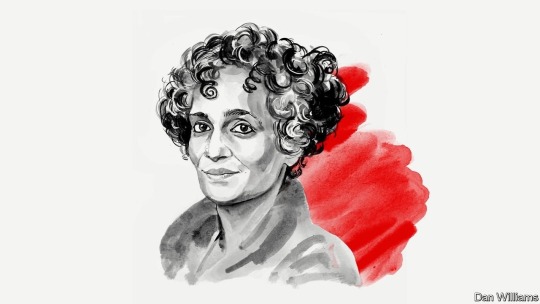
This By-invitation commentary is part of a series by a range of global thinkers on the future of American power, examining the forces shaping the country's standing.
IN FEBRUARY 1989 the last Soviet tank rolled out of Afghanistan, its army having been decisively defeated in a punishing, nearly decade-long war by a loose coalition of mujahideen (who were trained, armed, funded and indoctrinated by the American and Pakistani Intelligence services). By November that year the Berlin wall had fallen and the Soviet Union began to collapse. When the cold war ended, the United States took its place at the head of a unipolar world order. In a heartbeat, radical Islam replaced communism as the most imminent threat to world peace. After the attacks of September 11th, the political world as we knew it spun on its axis. And the pivot of that axis appeared to be located somewhere in the rough mountains of Afghanistan.
For reasons of narrative symmetry if nothing else, as the US makes its ignominious exit from Afghanistan, conversations about the decline of the United States’ power, the rise of China and the implications this might have for the rest of the world have suddenly grown louder. For Europe and particularly for Britain, the economic and military might of the United States has provided a cultural continuity of sorts, effectively maintaining the status quo. To them, a new, ruthless, power waiting in the wings to take its place must be a source of deep worry.
In other parts of the world, where the status quo has brought unutterable suffering, the news from Afghanistan has been received with less dread.
The day the Taliban entered Kabul, I was up in the mountains in Tosa Maidan, a high, alpine meadow in Kashmir, which the Indian Army and Air Force used for decades to practise artillery and aerial bombing. From one edge of the meadow we could look down at the valley below us, dotted with martyrs’ graveyards where tens of thousands of Kashmiri Muslims who had been killed in Kashmir’s struggle for self-determination are buried.
In India, the Bharatiya Janata Party (BJP), a Hindu nationalist group, came to power cunningly harnessing post-9/11 international Islamophobia, riding a bloody wave of orchestrated anti-Muslim massacres, in which thousands were murdered. It considers itself a staunch ally of the United States. The Indian security establishment is aware that the Taliban’s victory marks a structural shift in the noxious politics of the subcontinent, involving three nuclear powers: India, Pakistan and China, with Kashmir as a flashpoint. It views the victory of the Taliban, however pyrrhic, as a victory for its mortal enemy Pakistan, which has covertly supported the Taliban in its 20-year battle against the US occupation. Mainland India’s 175m-strong Muslim population, already brutalised, ghettoised, stigmatised as “Pakistanis”—and now, increasingly as “Talibanis”—are at even greater risk of discrimination and persecution.
Most of the mainstream media in India, embarrassingly subservient to the BJP, consistently referred to the Taliban as a terrorist group. Many Kashmiris who have lived for decades under the guns of half a million Indian soldiers, read the news differently. Wishfully. They were looking for pinholes of light in their world of darkness and indignity.
The details, the nuts and bolts of what was actually happening were still trickling in. A few who I spoke to saw it as the victory of Islam against the most powerful army in the world. Others as a sign that no power on Earth can crush a genuine freedom struggle. They fervently believed—wanted to believe—that the Taliban had completely changed and would not return to their barbaric ways. They too saw what had happened as a tectonic shift in regional politics, which they hoped would give Kashmiris some breathing space, some possibility of dignity.
The irony was that we were having these conversations sitting on a meadow pitted with bomb craters. It was Independence Day in India and Kashmir was locked down to prevent protests. On one border the armies of India and Pakistan were in a tense face-off. On another, in nearby Ladakh, the Chinese Army had crossed the border and was camped on Indian territory. Afghanistan felt very close by.
In its scores of military expeditions to establish and secure suzerainty since the second world war, the United States has smashed through (non-white) country after country. It has unleashed militias, killed millions, toppled nascent democracies and propped up tyrants and brutal military occupations. It has deployed a modern version of British colonial rhetoric—of being, in one way or another, on a selfless, civilising mission. That’s how it was with Vietnam. And so it is with Afghanistan.
Depending on where you want to put down history’s markers, the Soviets, the American- and Pakistan-backed mujahideen, the Taliban, the Northern Alliance, the unspeakably violent and treacherous warlords and the US and NATO armed forces have boiled the very bones of the Afghan people into a blood soup. All, without exception, have committed crimes against humanity. All have contributed to creating the soil and climate for terrorist groups like al-Qaeda, ISIS and their affiliates to operate.
If honourable ‘intentions’ such as empowering women and saving them from their own families and societies are meant to be mitigating factors in military invasions, then certainly both the Soviets and the Americans can rightly claim to have raised up, educated and empowered a small section of urban Afghan women before dropping them back into a bubbling cauldron of medieval misogyny. But neither democracy nor feminism can be bombed into countries. Afghan women have fought and will continue to fight for their freedom and their dignity in their own way, in their own time.
Does the US withdrawal mark the beginning of the end of its hegemony? Is Afghanistan going to live up to that old cliché about itself—the Graveyard of Empires? Perhaps not. Notwithstanding the horror show at the Kabul airport, the debacle of withdrawal may not be as big a blow to the United States as it is being made out to be.
Much of those trillions of dollars spent in Afghanistan circulated back to the US war industry, which includes weapons manufacturers, private mercenaries, logistics and infrastructure companies and non-profit organisations. Most of the lives that were lost in the US invasion and occupation of Afghanistan (estimated to be roughly 170,000 by researchers at Brown University) were those of Afghans who, in the eyes of the invaders, obviously count for very little. Leaving aside the crocodile tears, the 2,400 American soldiers who were killed don’t count for much either.
The resurgent Taliban humiliated the United States. The Doha agreement signed by both sides in 2020 for a peaceful transfer of power is testimony to that. But the withdrawal could also reflect a hard-nosed calculation by the US government about how to better deploy money and military might in a rapidly changing world. With economies ravaged by lockdowns and the coronavirus, and as technology, big data and AI make for a new kind of warfare, holding territory may be less necessary than before. Why not leave Russia, China, Pakistan and Iran to mire themselves in the quicksand of Afghanistan—imminently facing famine, economic collapse and in all probability another civil war—and keep American forces rested, mobile and ready for a possible military conflict with China over Taiwan?
The real tragedy for the United States is not the debacle in Afghanistan, but that it was played out on live television. When it withdrew from the war it could not win in Vietnam, the home front was being ripped apart by anti-war protests, much of it fuelled by enforced conscription into the armed forces. When Martin Luther King made the connection between capitalism, racism and imperialism and spoke out against the Vietnam war, he was vilified. Mohammad Ali, who refused to be conscripted and declared himself a conscientious objector, was stripped of his boxing titles and threatened with imprisonment. Although war in Afghanistan did not arouse similar passions on American streets, many in the Black Lives Matter movement made those connections too.
In a few decades, the United States will no longer be a country with a white majority. The enslavement of black Africans and the genocide and dispossession of native Americans haunt almost every public conversation today. It is more than likely that these stories will join up with other stories of suffering and devastation caused by US wars or by US allies. Nationalism and exceptionalism are unlikely to be able to prevent that from happening. The polarisation and schisms within the United States could in time lead to a serious breakdown of public order. We’ve already seen the early signs. A very different kind of trouble looms on another front too.
For centuries America had the option of retreating into the comfort of its own geography. Plenty of land and fresh water, no hostile neighbours, oceans on either side. And now plenty of oil from fracking. But American geography is on notice. Its natural bounty can no longer sustain the “American way of life”—or war. (Nor for that matter, can China’s geography sustain the “Chinese way of life”).
Oceans are rising, coasts and coastal cities are insecure, forests are burning, the flames licking at the edges of settled civilisation, devouring whole towns as they spread. Rivers are drying up. Drought haunts lush valleys. Hurricanes and floods devastate cities. As groundwater is depleted, California is sinking. The reservoir of the iconic Hoover Dam on the Colorado River, which supplies fresh water to 40m people, is drying at an alarming rate.
If empires and their outposts need to plunder the Earth to maintain their hegemony, it doesn’t matter if the plundering is driven by American, European, Chinese or Indian capital. These are not really the conversations that we should be having. Because while we’re busy talking, the Earth is busy dying.
— Arundhati Roy is a novelist and essayist.
0 notes
Text
With the compliments of, The Directorate General Public Relations,
Government of the Punjab, Lahore Ph: 99201390.
No.196/QU/Zahid
HANDOUT (A)
CM CONDOLES LOSS OF LIVES
LAHORE, February 05:
Chief Minister Punjab Sardar Usman Buzdar has expressed the deep sense of sorrow over the death of four persons of a family in a road accident near Bahawalpur and extended sympathies to the heirs. He has also sought a report from the administration.
******
No.197/QU/Zahid
HANDOUT (A)
CM USMAN BUZDAR AND GOVERNOR ATTENDS KASHMIR SOLIDARITY DAY FUNCTION AT GOVERNOR’S HOUSE
LAHORE, February 05:
A special ceremony was held at Governor’s House to express solidarity with oppressed Kashmiris on the occasion of Kashmir Solidarity Day on Friday.
Chief Minister Punjab Sardar Usman Buzdar, Governor Chaudhry Muhammad Sarwar, Law Minister Raja Basharat, SACMs Dr Firdous Ashiq Awan, Sardar Tanvir Ilyas, Aown Chaudhary, chairman ruet-e-hilal committee Maulana Abdul Khabeer Azad, ACS Punjab, Lahore commissioner, secretary information and people from different walks of life attended the ceremony while wearing black armbands.
The ceremony started with the airing of anthems of Pakistan and Azad Kashmir.
CM Usman Buzdar, in his address, asserted Pakistanis are observing Kashmir Solidarity Day to give a strong message to the world that Pakistan continues to side with the Kashmiris. Indian brutalities in Occupied Kashmir have been condemned the world over, he added. Different European parliamentarians and independent global bodies have also raised their voice against Indian aggression, he stated. PM Imran Khan is a genuine ambassador and advocate of Kashmir cause and he has vigorously fought the Kashmir cause at every world forum, he continued. The chief minister vowed that Pakistan will continue to extend its strong diplomatic support to Kashmiris at every level because Kashmir is a juggler vein of Pakistan. I believe that freedom of Kashmir is not far-off and India will face humiliation and Kashmiris will succeed in their just struggle, he appended.
Governor Chaudhry Sarwar also addressed the function.
******
No.198/QU/Zahid
HANDOUT (A)
CM GILGIT BALTISTAN CALLS ON CM PUNJAB
LAHORE, February 05:
Chief Minister Gilgit Baltistan Barrister Khalid Khurshid called on Chief Minister Punjab Sardar Usman Buzdar at his office on Friday and discussed matters of mutual interest. Both the chief ministers strongly condemned Indian brutalities in Occupied Kashmir and expressed complete solidarity with the oppressed Kashmiris.
Chairman Punjab Information Technology Board Azfar Manzur and Secretary to CM Gilgit Baltistan Usman Ahmed signed an MoU. Under the MoU, PITB will assist in developing CM complaint management system, web portal and task management system for GB.
Usman Buzdar assured full cooperation to the GB government adding that extended cooperation will be provided in health, education, IT and other sectors. He announced to provide training opportunities to GB's paramedical staff in nursing colleges adding that the issue of reservation of quota for the GB students in provincial medical colleges will also be given sympathetic consideration. The issue of quota in medical colleges will be amicably resolved, he continued. Meanwhile, the CM termed the PTI's success in GB elections a victory of the agenda of change and the vision of a new Pakistan. The people of Gilgit Baltistan are our brethren and the Punjab government will continue every possible cooperation for the development there, he assured.
Usman Buzdar stated that the people of Pakistan are standing with Kashmiris like a solid rock and asserted that no power on earth can weaken the immortal relationship between the peoples of Pakistan and Kashmir. Kashmir will continue to be a part of Pakistan, he repeated. The hands of the Modi regime are stained with the blood of Kashmiris as every Kashmiri is demanding freedom from Indian yoke, he added and assured to provide every possible cooperation to GB for its development. GB chief minister thanked Usman Buzdar for extending necessary cooperation adding that this would further promote brotherhood and unity between federating units. We are thankful to the Punjab government for its cooperation in health, education, IT and other sectors, he added. Khalid Khurshid maintained that Indian atrocities have been fully exposed before the world as the Modi regime is facing internal conflicts and strife. Pakistanis have always supported the oppressed people of Occupied Kashmir and the whole nation is united for Kashmir cause under the leadership of PM Imran Khan, he said.
Khalid Khurshid presented a traditional GB cap “Shanti” to Usman Buzdar and invited him to visit Gilgit Baltistan to watch a polo match. Usman Buzdar accepted the invitation and announced to visit GB soon. He also gifted a traditional stick of tribal areas to CM Khalid Khurshid.
Health Minister Dr Yasmin Rashid, SACM Dr Firdous Ashiq Awan and others were also present.
******
No.199/Ehtisham/Umer
HANDOUT (A)
LAHORE, February 05:
Punjab Chief Minister Sardar Usman Buzdar has expressed deep sense of sorrow and grief over the loss of precious human lives in a traffic accident in Mian Channu. The Chief Minister extended heartfelt sympathies and condolence with the bereaved family members of the deceased. The Chief Minister has also sought a report from administration about this incident.
0 notes
Text
┗ ° ✰ 。 BASICS : PART ONE 〉
FULL NAME: sebastian louis bristow.
NICKNAME(S): bas, b, seb, bristow and his siblings used to call him lou.
AGE: twenty-five.
DATE OF BIRTH: january 2nd, 1993.
NATIONALITY: american.
ETHNICITY: american & pakistani.
OCCUPATION: chief of financial office at bristow enterprises.
EDUCATION: he has a bachelors in mathematics from harvard university and he has a masters in business administration and public administration / international development from harvard kennedy business school.
ORIENTATION: bisexual and biromantic.
BIRTHPLACE: boston, massachusetts.
CURRENT RESIDENCE: west village, new york city.
RELIGION: unaffiliated/undecided.
ZODIAC: capricorn.
SPOKEN LANGUAGES: english as a native language; french, italian and spanish fluently, intermedium speaker of russian and japanese, and he knows the basics in arabic and urdu.
┗ ° ✰ 。 PHYSICAL APPEARANCE : PART TWO 〉
GENDER: cis male.
PRONOUNS: he/him/his.
HEIGHT: 6′1″ / 185 cm.
WEIGHT: it oscilates between 165 lbs / 75kg and 170lbs / 77kg.
BUILD: he’s slender, what one would consider athletic. he’s very active and works out a lot so it’s rather easy for him to stay fit. for the most part his body is toned, he has muscular arms due to boxing throughout his teen years and broad shoulders.
EYE COLOR: his eye colour tends to change, being a mix between hazel-green and a darker shade of amber.
HAIR COLOR: raven black.
TATTOOS: the quote no darkness like ignorance in arabic on his left collarbone, the quote who lives sees but who travels sees more in arabic on his right collarbone, the map of new york city’s underground tattooed on his right scapula. the quote don’t expect people to change split in two and on the inside of his right arm, the quote may i never be complete, may i never be content, may i never be perfect split in three parts and in italic font, tattooed on the left side of his ribcage. two tangled twin-flowers, representing his twin sisters, on the back of his right upper arm, xxiimxmxcvi aka the birthdate of his sister alana, in small bold letters on his left wrist. a fantail bird on the back of his neck / beginning of his back, a pair of wings on his chest, the quote empty vessels make more noise along his left hip and in urdu. he has a bee tattoo on his left ankle, a small J behind his right ear and right on his pressure point. on the inside of his ring finger, he has december 31st, 2016 in italic font. he has a sleeve tattoo on his left arm which includes pieces such as three very small tattoos, in uppercase and bold font, reading paris, boston and new york, his twin sisters initials, a lotus flower purposely faded and merged with the other tattoos, a few geometrical circles tangled together, the taurus constelattion aka his brother’s star sign, an inverted triangle near the end of his arm and just before a mandala tat begins, waves contained in a rectangle somewhere towards the inside of his arm, a small puzzle piece, a small black heart, a hanger in which you can read a. khan - a representation of his mother, five little dog paws - one for each of his dogs - and a small briefcase with aus bristow written in it.
PIERCINGS: regular lobes, nose, tragus and an industrial piercing.
┗ ° ✰ 。 FAVORITES : PART THREE 〉
PERSON: jasmine.
TIME OF DAY: around 3/4 am when the world outside is completely quiet.
FOOD: anything thai or indian.
CLOTHING: everchanging, it evolves as he grows and changes with his mood. his favorite pieces are outerwear -- leather jackets, statement coats, patchwork jackets, denim jackets, trench coats, blazers, he likes to play around with those.
HAIR STYLES: generally, he keeps his hair shorter on the sides and longer at the top, often wearing it styled to one of the sides or fluffed down.
SCENT: the scent of earth after it rained, cinnamon and coffee.
MUSIC: he tries to listen to a little bit of everything but there’s a clear preference for r&b and hip hop, particularly for soulful r&b voices and for songs he can connect with in some type of way, generally in a lyrical sense. he tends to stay away from most hype songs - he doesn’t listen to mumble rap - and he isn’t a fan of bubblegum pop.
T.V. SHOW(S): he doesn’t follow that many but he’s watched sense8 and loved it, he watches suits from time to time and he follows htgawm.
MOVIE(S): psycho, the silence of the lambs, misery, it, get out, scarface, casablanca and the godfather.
MUST HAVE(S): phone, his wallet, his keys, pack of cigarettes, peach mango bubblegum and a pair of sunglasses.
┗ ° ✰ 。 FUN FACTS : PART FOUR 〉
TEN MOST PLAYED SONGS:
ONE / d’evils by SiR
TWO / photograph by j. cole
THREE / why you love me now by jacquees
FOUR / slide on me by frank ocean
FIVE / king’s dead by jay rock, kendrick lamar, future and james blake
SIX / otw by khalid ft. 6lack and ty dolla $ign
SEVEN / come through and chill by miguel ft. j. cole and salaam remi
EIGHT / bedtime stories by rae sremmurd ft. the weeknd
NINE / basement by russ ft. jessie reyez
TEN / summer bummer by lana del rey ft. a$ap rocky and playboi carti
PLACE HE ALWAYS FALLS ASLEEP: he doesn’t fall asleep that easily but, on the rare, maybe on the sofa.
GAME HE’D DESTROY SOMEONE ELSE AT: poker and blackjack.
MOST USED EMOTICON: 🙄
HOW HE ACTS WHEN SLEEP DEPRIVED: far more affectionate than usual, a little bit whiny, almost like a child, really.
PREFERRED BEVERAGES ON COLD/HOT DAYS: black coffee in the mornings, doesn’t matter if it’s a cold or a hot day, and caramel macchiatos or kashmiri chai on cold nights.
HOW HE BOOSTS HIMSELF UP: it depends. if he’s down in a slump, he spends time with his family, particularly his little sisters, or he distracts himself with something methodic that demands a lot of focus from his end. if he’s trying to lift his spirits or be at ease, he usually tends to find his way to the rooftop of his building and just watch the city for a good moment.
ASPIRATION AS A CHILD: his goal has always been to follow his father’s footsteps so, at the end, he’s always wanted to work within business. when he started playing basketball, he considered pursuing a career within it but a severe injury ruined that dream for him.
IDEAL WEATHER: the weather after it rained.
THOUGHTS ON SINGING VOICE: it’s better than average and it’s actually pleasant to hear but bas is not very fond of it.
WHAT HE DOODLES: whatever comes to his mind in the moment.
┗ ° ✰ 。 THIS OR THAT : PART FIVE 〉
COFFEE OR TEA?: coffee.
SHOWERING IN DAY OR NIGHT?: shower in the day.
BATH OR SHOWERS?: showers.
T.V. OR MOVIES?: movies.
WRITING OR READING?: reading.
PLATONIC OR ROMANTIC?: both.
ICED TEA OR LEMONADE?: lemonade.
ICE CREAM OR SMOOTHIES?: smoothies.
CUPCAKES OR CAKE?: cupcakes.
BEACH OR MOUNTAINS?: beach.
1 note
·
View note
Text
Activists call for 'global spotlight' on plight of Kashmiris | News
Activists call for ‘global spotlight’ on plight of Kashmiris | News
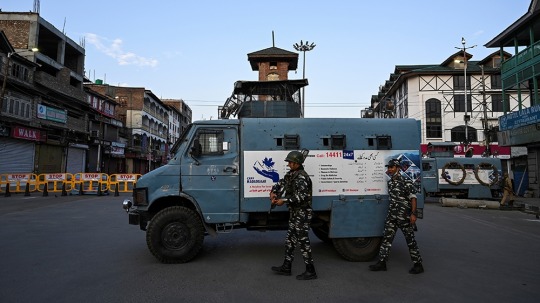
Black Lives Matter, Palestinian, Uighur and Rohingya activists have come out in support of the people of Indian-administered Kashmir, calling for a “global spotlight on the suffering and their resistance”, ahead of the one-year anniversary of the revocation of the region’s autonomy by India’s Hindu nationalist government.
On August 5, 2019, Indian Prime Minister Narendra Modi’s government…
View On WordPress
0 notes
Text
Activists call for 'global spotlight' on plight of Kashmiris
Activists call for ‘global spotlight’ on plight of Kashmiris

[ad_1]
Black Lives Matter, Palestinian, Uighur and Rohingya activists have come out in support of the people of Indian-administered Kashmir, calling for a “global spotlight on the suffering and their resistance”, ahead of the one-year anniversary of the revocation of the region’s autonomy by India’s Hindu nationalist government.
On August 5, 2019, Indian Prime Minister Narendra Modi’s…
View On WordPress
0 notes
Text
Campaigners urged to support 'Kashmiri Lives Matter'
Campaigners urged to support ‘Kashmiri Lives Matter’
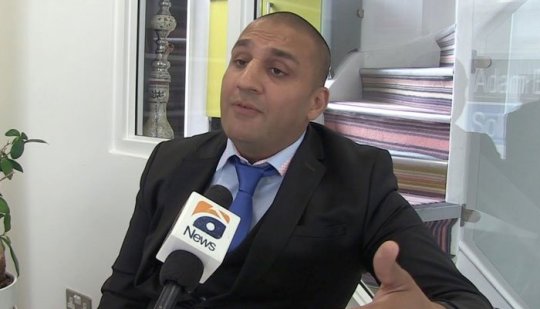
The News/Author
LONDON: British-Pakistani businessman and community leader Tarab Raja has said the Western world has recently woken up to the reality of Black Lives Matter but it also needs to pay attention to the “Kashmiri Lives Matter” campaign that has been going on for a long time.
In an interview with The News, the campaigner said the killing of George Floyd in America has infused a new…
View On WordPress
0 notes